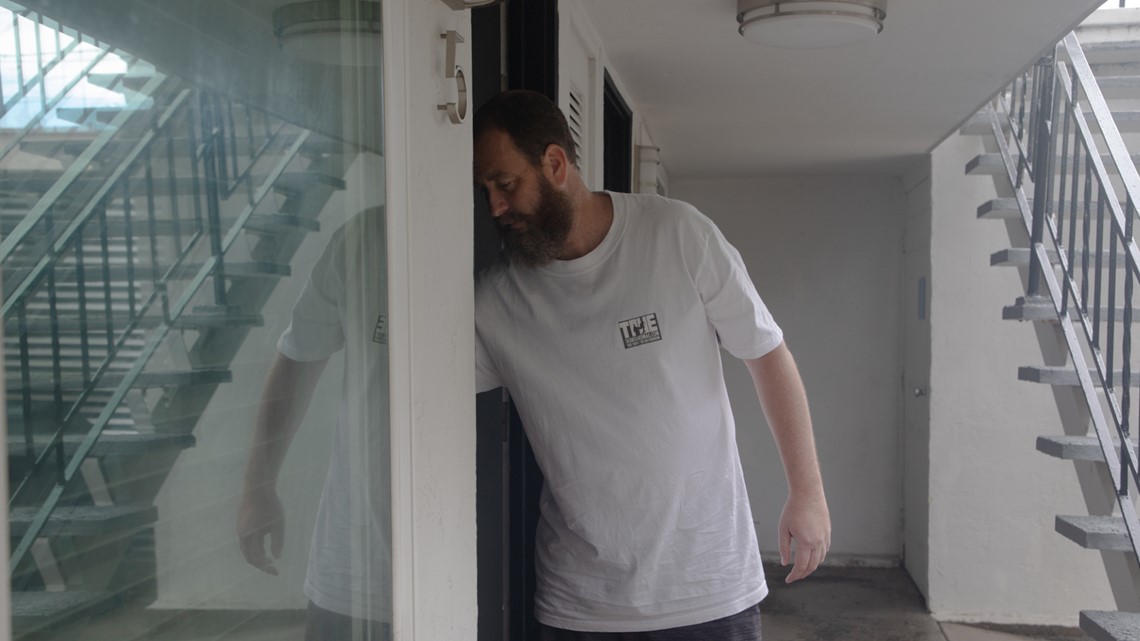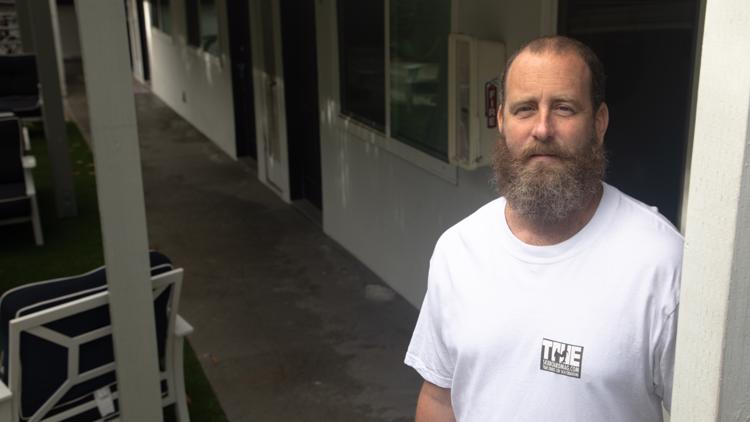SAN DIEGO — As people continue to lose income in the wake of the coronavirus pandemic, tenants and landlords fear a domino effect in San Diego’s already strained housing market.
For years, a lack of affordable housing and a booming short-term vacation market has squeezed renters in San Diego. Now, a statewide temporary ban on all evictions of renters affected by COVID-19 seeks to provide short-term security for them.
But tenants and landlords both say the eviction ban is just delaying the inevitable: A wave of evictions when tenants can’t pay back rent and a flood of loan defaults when landlords can’t pay their mortgages.
National data shows that through the first five days of April, 31% of renters failed to pay their rent, according to the National Multifamily Housing Council. For the same period in March, 19% had not paid their rent.
The San Diego Tenants Union organized a rent strike last week, urging tenants affected by the COVID-19 crisis to show proof of lost income and asking other tenants to stand in solidarity any way they can. The goal is to have rents canceled until the crisis passes. Meanwhile, landlords say they are struggling over how they will pay their own bills. The eviction ban shifts the burden to landlords, they say, and fails to take advantage of state and federal assistance to keep rental income flowing. Without it, they say, they could lose their investment.
Before Gov. Gavin Newsom imposed a state eviction ban on March 27, the city of San Diego and the county passed moratoriums that required tenants affected by the coronavirus to provide proof of lost income and order all rent to be paid back at a later date.
Rafael Bautista, an organizer with the San Diego Tenants Union, said requiring people who have lost their income to pay back rent doesn’t make much sense.
Nearly two in five U.S. workers were already living paycheck to paycheck, according to a 2020 Global Benefits Attitudes Survey.
In March, California processed roughly 1.1 million unemployment insurance claims, including more than 878,000 in the last week of the month, according to the state’s Employment Development Department.
Last week, when many rents were coming due on the first of the month, the City Heights Community Development Corporation said it had received 55 calls in two days from people unable to pay their rents.
The corporation is an affordable housing nonprofit that focuses on enhancing the quality of life in City Heights. Its emergency rental assistance program, established in October, offers one-time assistance to people who need a few hundred dollars to cover rent. It went from assisting four to five City Heights households a month to now helping 20 to 24 households a week throughout the county because of the coronavirus, said Laura Ann Fernea, the nonprofit’s executive director.
Tommie Zam, who rents a studio apartment in Pacific Beach, started getting his hours cut about a month ago at the clothing store where he works. Then the clothing store’s assistant manager called and told the 44-year-old he would be furloughed until further notice. Zam said he found himself deciding between paying rent or buying food.


Last week, when rent was due, he could only pay about half, he said, and he’s worried he may lose his apartment.
Even with unemployment benefits, which he’s applied for, Zam said he doesn’t know how much of his expenses they will cover or how long this crisis will last.
“We’ve all got to be careful with what we spend and what we do,” he said.
Bautista said some tenants have been threatened with a 60-day eviction notice if they don’t come up with the money.
That’s why he organized the rent strike, using social media and word of mouth to spread the message. It now has more than 100 participants, he said, predicting hundreds more will join. He’s asking renters who can afford to make payments to stand in solidarity — either by participating in the strike or helping neighbors with housing costs.
Bautista hopes the strike will raise awareness and pressure leaders to take stronger measures to protect renters.
“We can’t trust the system to take care of things,” he said. “They created a moratorium that’s weak at the city level, at the county level, at the state level, and tenants need more protection.”
The consequences of a rent strike could be catastrophic, said Norm Miller, a real estate finance professor at the University of San Diego. The nation is facing a much deeper recession than the 2008 financial crisis, and it will be much more painful, he said.
Landlords will face financial difficulty, Miller said, and some might default on their loans and struggle to hold onto the properties.
If people who can afford to pay their rent suddenly stop doing so, “they’re going to take a number of properties down, and that would be terribly unfortunate and unfair to the landlord side,” he said.
Ben Schenk, a law student who owns two properties in Logan Heights with 30 units total, conducted a survey of landlords using Google Forms, and more than 250 San Diego County housing providers responded. The results show that almost one out of every 10 cannot afford to go one month without the income from their renters. About half of those surveyed could only afford to pay their mortgage for one or two months with savings.
Escondido residents Barry and Sharon Herbst said they invested their retirement savings into three rental properties — 20 units total — in Spring Valley, La Mesa, and National City. They fear they will lose their investments if they stop receiving rental income.


“The thing that I find most appalling is that the government expects us to be the good Samaritan and give people a free place to live during this,” said Barry Herbst, 65.
The government should require a portion of all state and federal assistance, as a result of COVID-19, to go toward rent, he said, adding that he and his wife can’t afford to shoulder the burden themselves.
“We do not live a lavish or excessive lifestyle,” Herbst said. “Many times, going out to dinner meant getting pizza or a hotdog from Costco.”
Herbst was forced into an early retirement after a layoff in 2014, he said. He and his wife downgraded to a smaller house in Escondido and invested their life savings in rental properties. But he quickly learned they would not be able to live off that income. Sometimes two or three months would pass before he could break even with management, maintenance and utility expenses, he said, so he went back to work at a property investment firm.
Now, he and his wife are worried about what will happen if their tenants are unable to make payments.
The company he works with to manage his properties has already asked him to pay $20,000 — $10,000 right away and $10,000 in a couple of weeks — to cover property taxes and other expenses due this month. He had to borrow money from his son, he said.
“I don’t want to see anyone on the street, and that’s not what it’s about,” Herbst said. “It’s that the government is expecting us to bear the brunt of this.”
The San Diego City Council, before it passed its eviction ban, asked Mayor Kevin Faulconer and his staff to work with lenders to provide relief to landlords. Faulconer’s staff did not respond to inewsource’s questions about whether that happened.
Council President Georgette Gómez said the city has already ensured that water will not be shut off to homes and businesses and late fees won’t be charged.
“The City is doing what it can, and I will continue to bring forward economic relief proposals and ensure that we are communicating every possible resource available to help all San Diegans – tenants, landlords, everyone – get through this crisis. … We all have to come together during this time to take care of each other,” Gómez said in an email.
Currently, nothing in the eviction moratoriums require people who receive government assistance, due to a substantial loss of income because of the coronavirus, to pay a portion of it toward rent.
Schenk, the landlord who conducted the survey, said more should be done to help rental property owners. He developed a proposal and sent it to San Diego City Council members and Faulconer’s office. He hopes they will consider changing the eviction moratorium to also assist landlords.
He suggests that not only should tenants have to notify landlords and show proof of lost income, but they should also be required to apply for unemployment or pandemic assistance within 48 hours of giving that notice. Rental property owners should then be allowed to rescreen a tenant’s income, to capture the government assistance, and apply the same rent-to-income percentage — maybe 30 percent — to the new rent until society returns to normal.
Landlords should be allowed to evict if tenants don’t follow that process to keep rental income flowing, Schenk wrote in his proposal.
“The focus should be maintaining some semblance of security and stability for everyone in the ecosystem,” he said.



